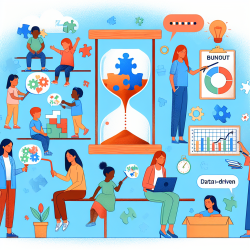Introduction
In the ever-evolving field of speech-language pathology, staying informed about the latest research is crucial for delivering effective therapy. A recent study titled "Cross-cultural adaptation and validation of a Brazilian version of an instrument to assess impairments related to oral functioning of people with Down syndrome" offers valuable insights that can be leveraged to enhance therapy outcomes for children with Down syndrome (DS). This blog explores the study's findings and discusses how practitioners can apply these insights to improve their skills and encourage further research.
Understanding the Study
The study aimed to adapt and validate an instrument originally developed in Canada for assessing oral functioning impairments in individuals with DS, specifically for the Brazilian Portuguese-speaking population. This instrument evaluates impairments across four categories: eating, communication, oral parafunction, and oral symptoms. The research involved translating the instrument, ensuring cultural relevance, and testing its reliability and validity.
Key Findings
- The instrument demonstrated strong reliability, with an internal consistency (Cronbach’s alpha) of 0.80 for the total scale.
- Test-retest reliability was also robust, with Intraclass Correlation Coefficient (ICC) values ranging from 0.78 to 0.88.
- Construct validity was confirmed through significant correlations between the instrument scores and clinical measures of malocclusion.
- Discriminant validity was established by showing different mean scores between individuals with DS and their non-DS siblings.
Implications for Practitioners
For practitioners working with children with DS, this study highlights the importance of culturally adapting assessment tools to ensure accuracy and relevance. By utilizing validated instruments, therapists can more effectively identify and address oral health impairments, ultimately enhancing the quality of life for their clients. Here are some actionable steps practitioners can take:
- Incorporate Validated Tools: Use culturally adapted and validated tools in assessments to ensure comprehensive evaluations of oral health impairments.
- Collaborate with Caregivers: Engage caregivers in the assessment process to gain insights into the child's oral health and tailor interventions accordingly.
- Promote Further Research: Encourage ongoing research to adapt and validate assessment tools for diverse populations, ensuring inclusivity in therapy practices.
Encouraging Further Research
While this study provides a solid foundation, it also underscores the need for continued research. Practitioners are encouraged to explore further cross-cultural adaptations and validations of assessment tools to accommodate the diverse needs of children with DS worldwide. By contributing to research efforts, practitioners can play a pivotal role in advancing the field and improving therapeutic outcomes.
Conclusion
The cross-cultural adaptation and validation of assessment tools are essential steps in providing effective therapy for children with DS. By leveraging the findings of this study, practitioners can enhance their skills, deliver more accurate assessments, and ultimately improve the quality of life for their clients. To read the original research paper, please follow this link: Cross-cultural adaptation and validation of a Brazilian version of an instrument to assess impairments related to oral functioning of people with Down syndrome.










